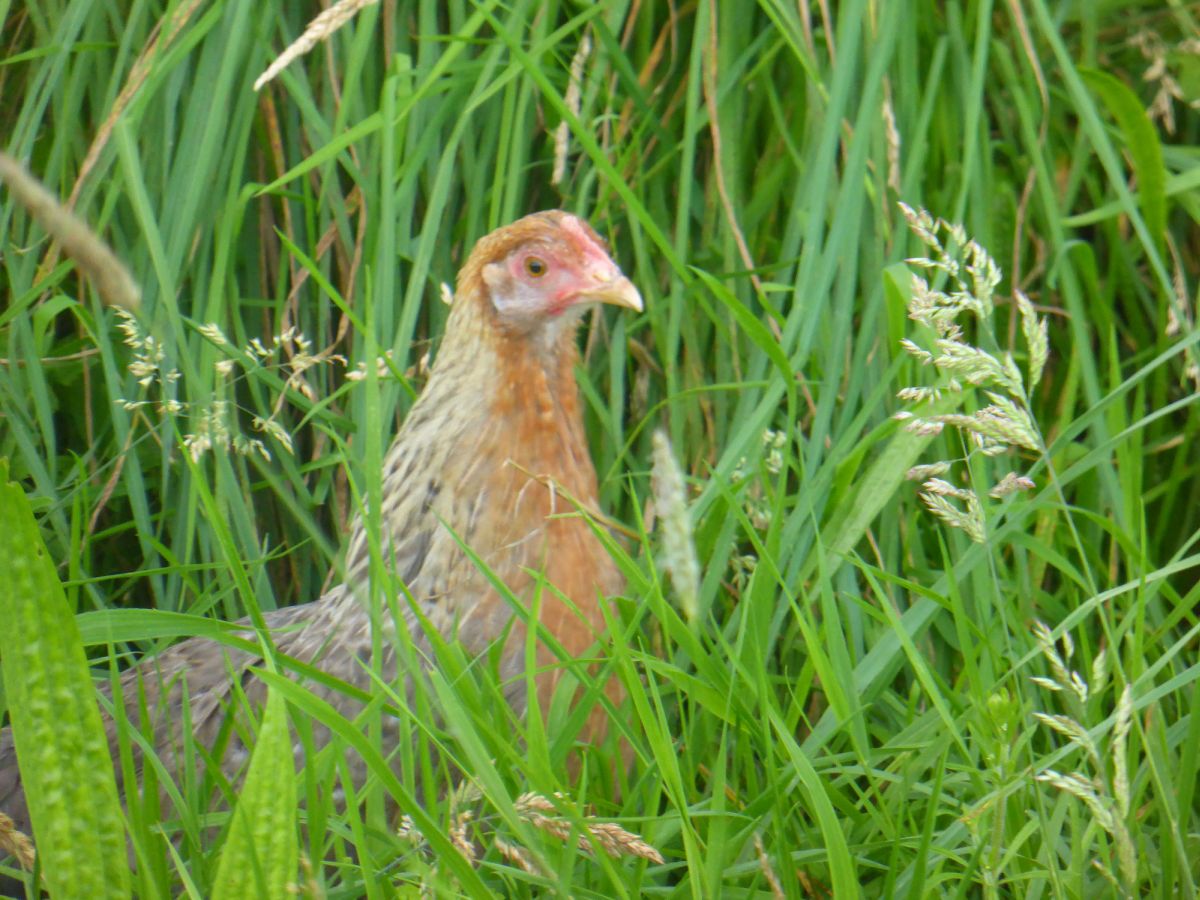Sour crop in chickens is a nightmare for any chicken keeper, so it’s best to be prepared before having to deal with it. Sour crop is a fungal infection that can be caused by many medical and environmental concerns.
Luckily, there are ways to treat and prevent this condition to ensure that your flock stays safe. So, how can you help a chicken with sour crop?
What is Sour Crop in Chickens?
Sour crop, also called thrush or candidiasis, is a fungal infection that occurs in your chicken’s crop. It’s caused by a fungus called Candida albicans.
A chicken’s crop should empty itself naturally, but if it doesn’t empty fast enough or fails to fully remove all the food, food will remain trapped in the crop, leading to an infection. If food sits in the crop for too long, it will ferment or break down, which is how the fungus develops.
A bacteria bloom in the crop will disrupt your chicken’s normal digestive processes. It could cause the organ to shrink or the walls of the crop to thicken. If not treated, a full blockage will occur, which can eventually cause death in chickens.
Understanding a Chicken’s Digestive System
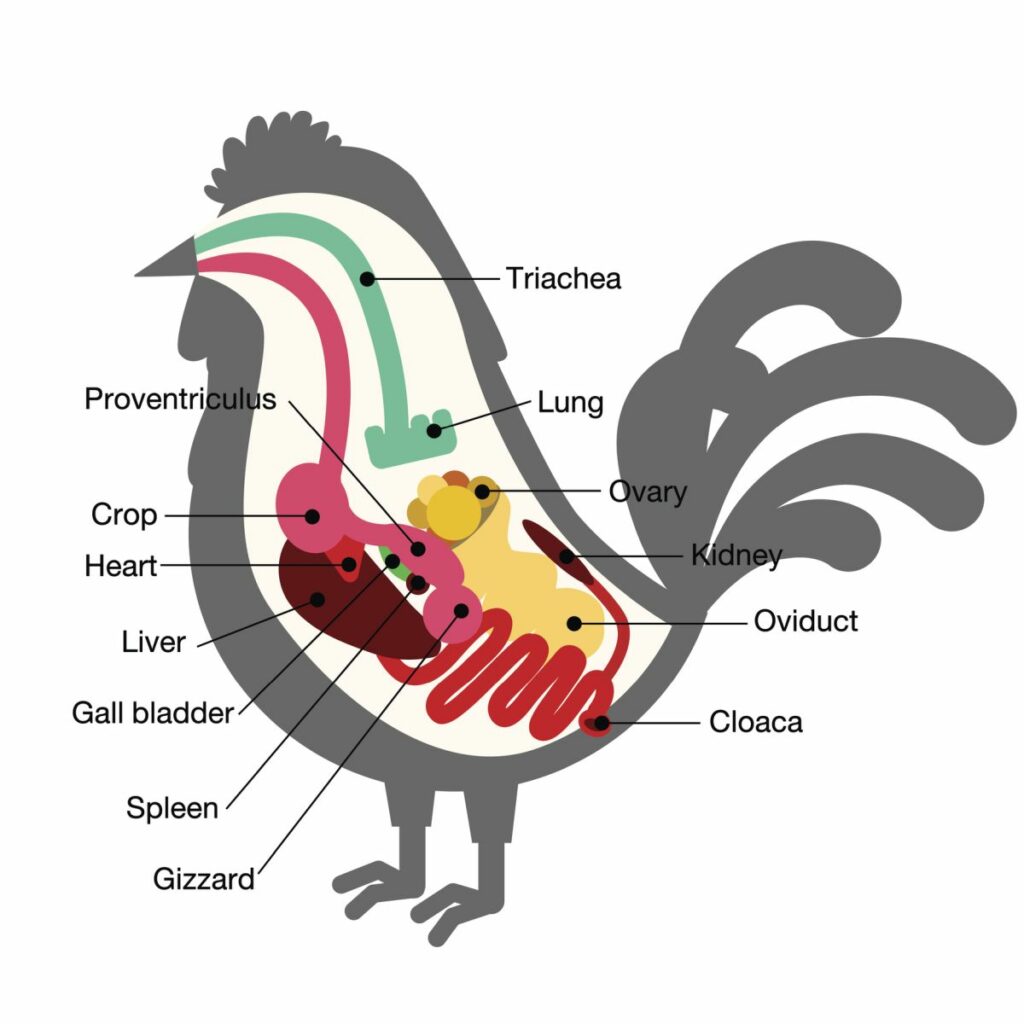
To fully understand how to treat and care for a chicken with sour crop, you’ll need to know what a crop is and what its role in the digestive system is. Chickens don’t digest food the same way that a human would.
Here is how food travels through the chicken’s body:
- Mouth – The digestive process starts when food enters the chicken’s mouth. They swallow the food whole because they don’t have teeth. The enzymes in their mouth break down the food a bit.
- Esophagus – Then, as the food breaks down, it passes through the esophagus, which is a pipe that connects the mouth to the crop.
- Crop – The crop is a storage pouch for food before it heads to the gizzard. It has bacteria to help break food down further. The crop usually empties itself in two to four hours, so if it doesn’t empty, that could be a sign of chicken sour crop.
- Proventriculus – Next, the food passes through the proventriculus, which connects the crop and gizzard. It adds enzymes to break down the food even further.
- Gizzard – The gizzard is a muscular organ that stores grit to grind down the food as much as possible. As it grinds, nutrients and water are removed from the waste to benefit your bird.
- Cloaca – Finally, the waste that remains after the process exits through the cloaca as feces.
So, if your chicken has a sour crop, it effects the entire digestive system and causes food to be unable to pass through your chicken’s body.
What Causes Sour Crop?
Candida albicans is what leads to a sour crop, but the fungus doesn’t appear out of nowhere. Here are few reasons a chicken may develop that fungus.
A Slow-Emptying Crop
Some chickens can’t process food through the crop as quickly as others. A slow-emptying crop doesn’t guarantee an infection, but it puts chickens at a higher risk, especially if they face one of the other causes. Adjusting their diet may help their crop work more efficiently.
Injuries
If there’s anything abnormal about your chicken’s crop, if may not process as fast. Injuries are a common cause for crop abnormalities. Chickens often eat things they shouldn’t, so if a sharp object entered their digestive system, it could harm the crop on the way.
Antibiotics
Antibiotics are usually a good thing when your chicken is ill, but in some circumstances, they could disrupt the natural balance of microorganisms in the crop. Some antibiotics could lead to an overgrowth of bacteria.
Diseases
Chickens with infections and other diseases are more susceptible to other conditions too. Certain chicken ailments could spread unhealthy viruses and bacteria across your chicken’s digestive system, causing it to not work properly.
Worms
An infestation of worms is dangerous for your chicken, and they can create blockages in the digestive tract. If they invade one area of your chicken’s digestion, they can spread to another one in no time.
The worms that are most likely to infest the crop are thread worms. They will absorb nutrients from your chicken’s body, causing malnutrition and weight loss.
Long Grass
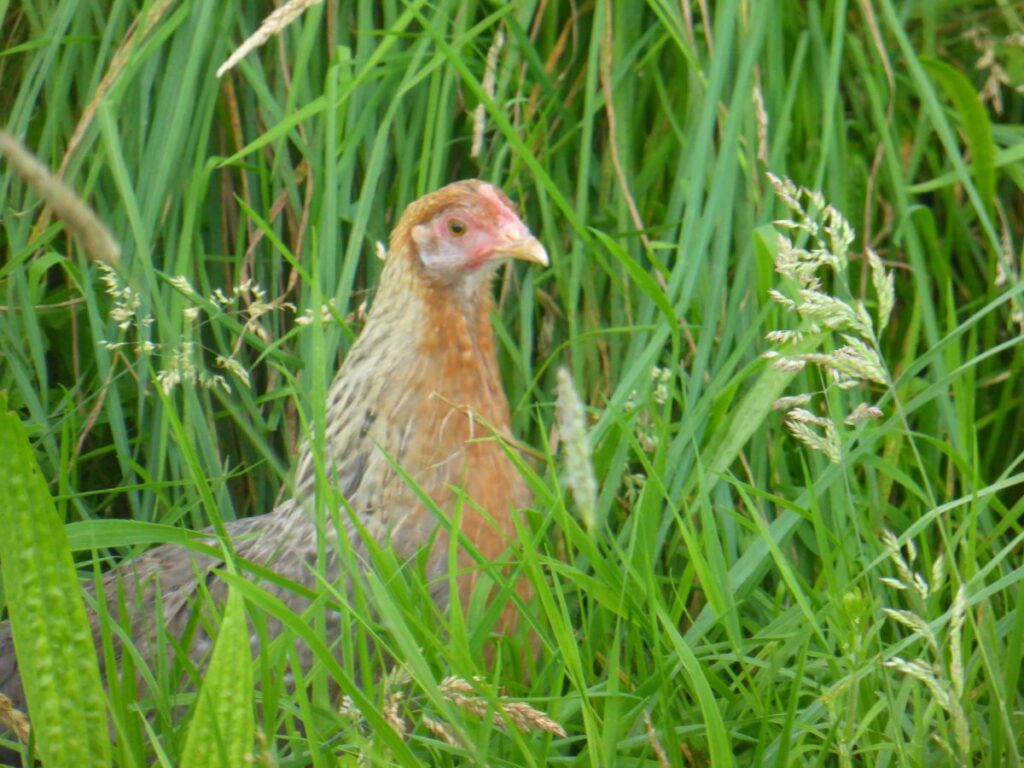
Like worms, long blades of grass can also clog your chicken’s digestive tract. Dense grass may be difficult to digest, and if there’s a lot of it, it can clump together in the crop. The smaller the chicken, the less grass is needed to interfere with their organs.
Moldy Food
Moldy food is unhealthy for anyone, but it can specifically affect the pH balance of the crop. Switching your chicken to an unusual diet could also cause digestion complications.
Sour Crop Symptoms
A chicken with a full crop will have visible swelling, and when you touch them near their crop, it’ll feel squishy. The crop should empty itself overnight, but if it still feels bloated in the morning, it’s likely that the crop isn’t emptying itself.
Yet, that’s only one sign that something is wrong. Here are some other chicken sour crop symptoms:
- Lethargy/weakness
- Loss of appetite
- Weight loss
- Diarrhea
- Foul-smelling breath
- Gurgling sounds in the stomach
- Decreased egg production
- Decreased egg quality
It’s important to note that chickens cannot vomit. So, if fluids come out of their mouth, it’s likely an overflow from their crop.
If you suspect that your bird is a victim of sour crop, you can take away their access to food and water overnight. If the crop still feels full in the morning, then you should seek treatments for sour crop.
Sour Crop Treatment Options
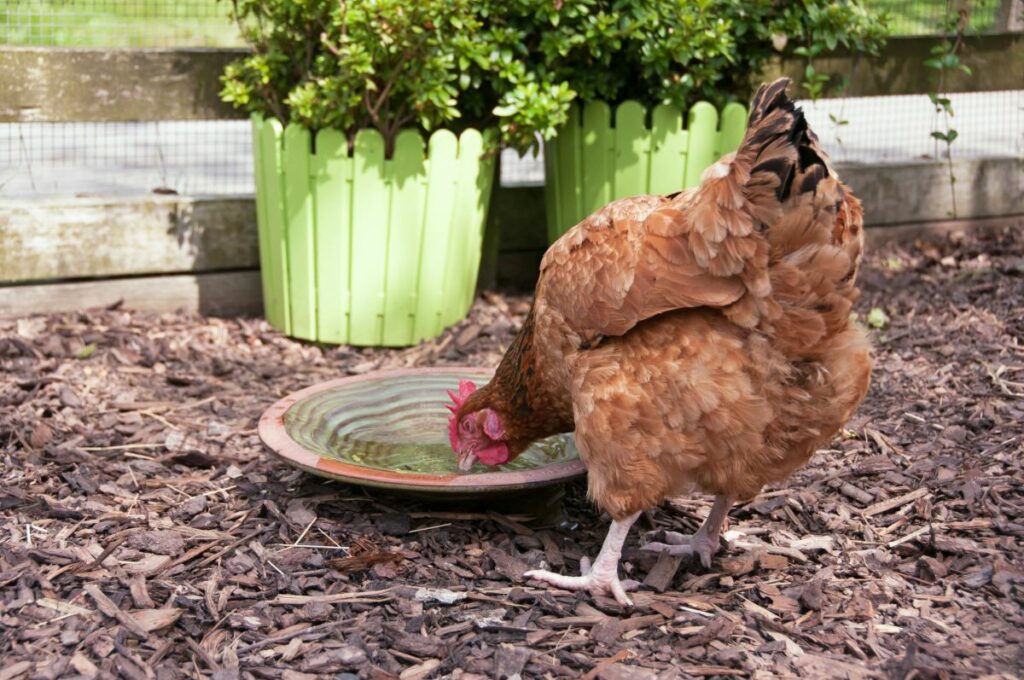
There are several ways to treat sour crop, but some are riskier than others. If you don’t feel confident solving the issue yourself, take your chicken to a vet that cares for birds.
It’s most effective to isolate your affected chicken while treating them. Separating the chicken can make it easiest to monitor symptoms and give your chicken special ingredients. Here are a few treatment options to consider.
Serve Only Water
Most chickens will stop eating if they have a sour crop, but keep them away from food just in case. Give them unlimited amounts of water to help ease the food through the crop without adding more to the problem. Usually, this method alone won’t solve the issue, but it can help all treatments work faster.
Coconut Oil
Coconut oil or olive oil are other liquids that can be given in addition to water. Use a dropper to serve the oil to your chicken three times throughout the day. Massaging the crop after can help get the food moving. You can also use apple cider vinegar instead.
Epsom Salts
Epsom salts, also known as magnesium sulfate, can detoxify a chicken’s crop. Using a syringe, you can serve it to your chicken two to three times per day by mixing one teaspoon with a cup of water. You can do this for two to three days, which should empty the crop by then.
Molasses
Molasses is an alternative to epsom salts, and it’s commonly used if the chickens put up a fight when you try to give them epsom salts. You can mix one pint of molasses with five gallons of water, and then serve it to them as a regular dish of water.
Only give them access to the molasses water for 8 hours at a time, and do not let other birds access the water. Then, you can replace it with regular water. Runny poop may be a side effect of molasses.
Copper Sulfate
Copper sulfate is another detoxifier for the crop. Add a half teaspoon of it to a gallon of their drinking water every other day for five days. Keep this drinking water away from healthy birds in your flock.
While this option can be effective, it’s also risky if not done properly. Do not give your chicken more than recommended because copper sulfate can be toxic in high concentrations. Also, do not use a metal water bowl because the substance could cause a reaction when it comes into contact with the metal.
Tomato Juice
There is no medical evidence that tomato juice is effective, but it’s harmless and worth a try. For one day, you can give your bird one to two milliliters of tomato juice two to three times. The acidity of the juice can help restore the balance in the crop to help it resume regular digestion.
Physically Empty the Crop
With most of these methods, you’ll also need to massage the crop to encourage the food to keep moving. Externally, you can rub the crop from bottom to top to help break up the clump of food inside.
Veterinarian Prescription
In severe cases, you may need a vet prescription to heal your chicken. Nystatin is one medication they might suggest. Even if your chicken isn’t currently sick, you should find a vet that takes chickens and save their number for future emergencies.
What to Do After Treating a Sour Crop
You’ll know if your treatment method was successful if the chicken’s crop becomes flat again. For the next day or two, take it easy and ease the bird back into their daily routine.
Serve chicken feed mixed with ingredients that are easy to digest, such as plain yogurt or scrambled eggs. Only feed the chicken small meals throughout the day, but give them access to water at all times.
If your chicken is acting normal after this, you can introduce them back into the coop. Keep a closer eye on them for the next few days to make sure no issues arise.
How to Prevent Sour Crop
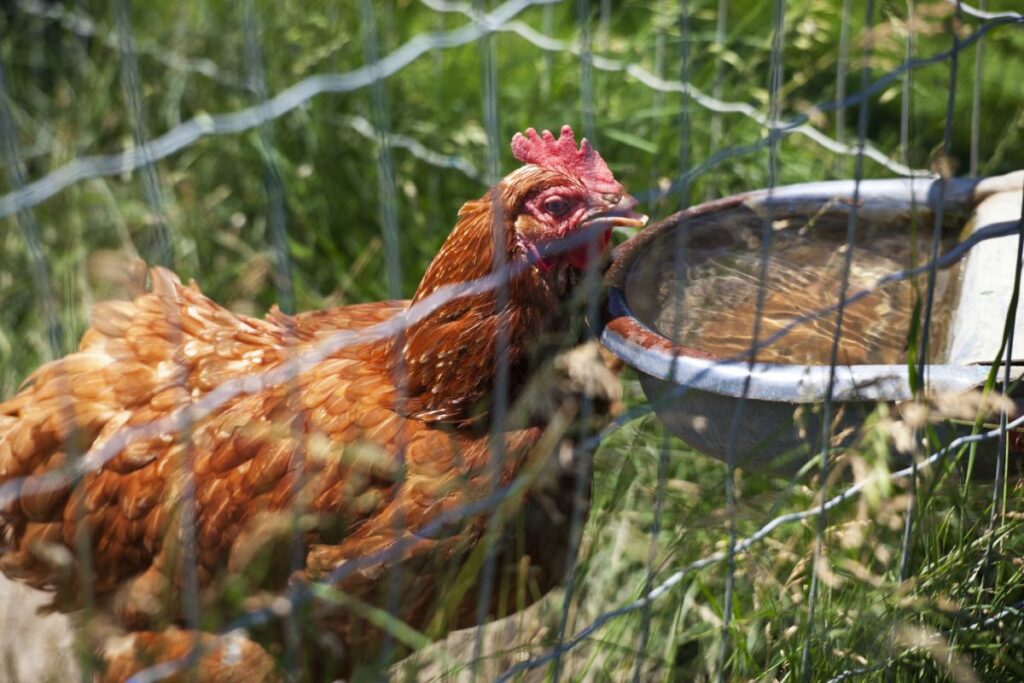
Keeping a chicken’s environment healthy is the best way to reduce the risk of sour crop. Here are a few tips to keep your birds safe:
- Give your chickens unlimited access to clean water.
- Mix herbal additives, such as oregano, fennel seeds, and parsley, to their feed to aid digestion. Sugar-free yogurt can also help.
- Provide your chickens with worm-preventing ingredients, such as garlic, pumpkin seeds, and catnip.
- If your chickens don’t free-range, give them access to plenty of grit.
- Keep grass in the chicken enclosure shorter than four inches.
- Pick up any hazardous debris.
- Avoid giving your chickens starchy foods like bread, pizza, and pasta.
- Clean the enclosure regularly.
- Take your chickens in for health checkups.
Even with all these precautions, it’s still possible for some of your chickens to get sour crop, but these methods will greatly reduce the risk. The more steps you take to protect your chickens’ health and wellbeing, the less diseases they’ll contract.
Frequently Asked Questions
Asking questions is an important part of caring for animals, so here are some things chicken keepers commonly wonder.
Any bird that has a crop can get sour crop. Turkeys, ducks, geese, and parrots could all get a sour crop like chickens, and the treatment and prevention methods are similar.
No, sour crop is not contagious, but if your chicken got it from something in their environment, other birds in the flock could run into the same issue. Separating a chicken with sour crop is for monitoring their food and water intake, not to keep them away from other chickens.
Final Thoughts
Sour crop in chickens is more common than most chicken keepers realize. If your chicken is showing symptoms, serve them water, add beneficial ingredients to their food, and massage their crop as needed. When in doubt, contact a veterinarian for help.
Prevention is key for any health concern. So, if you’re a chicken keeper, keep their enclosure clean and free of harmful materials. Adding herbal and anti-worm ingredients to their food may also reduce the risk.
